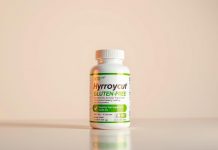You’re probably wondering if gluten-free diet pills are actually effective. Well, you’ve come to the right place! In this article, we’re going to explore the world of gluten-free diet pills and delve into their effectiveness. With so many people embracing gluten-free lifestyles, these pills have gained popularity as a convenient solution. Whether you’re aiming for weight loss or dealing with gluten intolerance, we’ll uncover the truth about the effectiveness of these diet pills, helping you make an informed decision about your health and wellness journey. So, let’s jump right in!
Table of Contents
Gluten-Free Diet Pills
What are gluten-free diet pills?
Gluten-free diet pills are a type of dietary supplement designed to assist individuals who follow a gluten-free diet. These pills are specifically formulated to help those who have gluten intolerance, celiac disease, or gluten sensitivity. By taking these pills, individuals hope to alleviate symptoms associated with gluten intolerance and maintain a healthy lifestyle.
The concept of gluten-free diets
Gluten-free diets have gained significant popularity in recent years, not only among individuals with diagnosed gluten intolerance but also among those pursuing a healthier lifestyle. The primary principle behind a gluten-free diet is the exclusion of gluten, a protein found in certain grains, such as wheat, barley, and rye. Gluten can trigger adverse reactions in individuals with gluten sensitivity or celiac disease, leading to digestive issues, skin problems, and other negative symptoms.
Rise in popularity of gluten-free diet pills
As the awareness of gluten intolerance and the health implications of gluten consumption has grown, so has the demand for gluten-free alternatives. This has led to the development of gluten-free diet pills to cater to individuals who want to maintain a gluten-free lifestyle and seek additional support. The convenience and potential benefits offered by these pills have contributed to their increasing popularity among those adhering to a gluten-free diet.
Understanding Gluten Intolerance
Definition of gluten intolerance
Gluten intolerance, also known as gluten sensitivity, occurs when the body has an adverse reaction to gluten consumption. While it shares similarities with celiac disease, gluten intolerance does not cause the same damage to the small intestine’s lining. However, individuals with gluten intolerance experience uncomfortable symptoms, such as bloating, diarrhea, fatigue, and abdominal pain, after eating gluten-containing foods.
Celiac disease and gluten sensitivity
Celiac disease is an autoimmune disorder characterized by gluten-induced damage to the small intestine. Unlike gluten sensitivity, celiac disease necessitates lifelong dietary management, as exposure to gluten can lead to long-term complications and serious health issues. Both conditions require the avoidance of gluten in order to alleviate symptoms and maintain overall health.
Symptoms and health risks associated with gluten intolerance
Gluten intolerance can manifest in various ways, affecting different individuals differently. Common symptoms include digestive issues like bloating, gas, diarrhea, and constipation. Other symptoms may include fatigue, headaches, joint pain, skin problems, and brain fog. If left untreated, gluten intolerance can lead to malnutrition, vitamin deficiencies, infertility, and an increased risk of developing other autoimmune conditions.

The Mechanism of Gluten-Free Diet Pills
How do gluten-free diet pills work?
Gluten-free diet pills typically contain ingredients that assist in the digestion and breakdown of gluten proteins. These ingredients may help reduce adverse reactions to gluten, alleviate symptoms, and potentially improve overall digestive health. Some pills may also include probiotics to support gut health, as individuals with gluten intolerance often experience imbalances in their gut microbiota.
Ingredients commonly found in gluten-free diet pills
Gluten-free diet pills often contain enzymes such as amylase, protease, and lipase, which aid in the digestion of carbohydrates, proteins, and fats. These enzymes help break down gluten proteins into smaller fragments that are easier to digest, reducing the likelihood of adverse reactions. Additionally, supplements may include herbal extracts or vitamins to support the body’s immune system and promote overall well-being.
Potential benefits of gluten-free diet pills
The primary benefit of gluten-free diet pills is their potential to alleviate symptoms associated with gluten intolerance. By assisting with the digestion of gluten proteins, these pills may help reduce the occurrence and severity of digestive issues, such as bloating and diarrhea. Additionally, they may alleviate fatigue, improve energy levels, and support overall gut health. However, it’s important to note that while gluten-free diet pills may provide relief, they do not treat or cure gluten intolerance or celiac disease.
Evidence of Effectiveness
Scientific studies on the effectiveness of gluten-free diet pills
Research on the effectiveness of gluten-free diet pills is still in its early stages, and there is limited scientific evidence available. However, some studies have shown promising results. A double-blind, placebo-controlled study conducted on individuals with self-reported gluten sensitivity found that a gluten-specific enzyme blend significantly reduced symptoms such as bloating and gas compared to a placebo. Similarly, another study suggested that certain gluten-digesting enzymes could help break down gluten proteins more effectively and reduce the immunogenicity of gluten.
Positive outcomes and limitations of current research
While there have been positive outcomes in certain studies, it is important to consider the limitations of the current research. Many studies are small-scale or have limitations in design, making it difficult to draw definitive conclusions. Additionally, research primarily focuses on the efficacy of enzymes used in gluten-free diet pills rather than the pills themselves as a whole. Further large-scale, well-controlled studies are needed to provide clearer evidence on the overall effectiveness of gluten-free diet pills.

Safety and Side Effects
Safety considerations for gluten-free diet pills
Gluten-free diet pills, when used as directed, are generally considered safe for most individuals. However, it is important to choose reputable brands and consult with a healthcare professional before starting any new dietary supplement. Some individuals may have specific medical conditions or allergies that could interact with the ingredients in the pills, so personalized guidance is essential to ensure safety.
Potential side effects and risks
While side effects are typically rare, some individuals may experience minor gastrointestinal discomfort, such as gas or bloating, when initially taking gluten-free diet pills. These side effects are usually temporary and subside as the body adjusts. However, it is crucial to discontinue use and seek medical advice if any severe adverse reactions occur.
Interactions with other medications or conditions
It is important to disclose all medications and health conditions to a healthcare professional before starting gluten-free diet pills or any new dietary supplement. Certain medications or medical conditions may interact with the ingredients in the pills or require dose adjustments. Consulting a healthcare professional will help ensure there are no potential conflicts and that the pills are safe to use alongside other treatments or conditions.
Regulation and Quality Control
Regulatory oversight of gluten-free diet pills
Dietary supplements, including gluten-free diet pills, are regulated by governmental agencies such as the Food and Drug Administration (FDA) in the United States. However, it is important to note that the regulation of dietary supplements is different from that of prescription medications. While manufacturers must adhere to certain regulations, such as Good Manufacturing Practices (GMP), the FDA does not evaluate or approve dietary supplements for safety or efficacy before they reach the market. Therefore, it is crucial to select products from reputable manufacturers and brands that prioritize quality control.
Controversies surrounding the labeling of gluten-free products
Due to the growing popularity of gluten-free diets, there have been discussions and controversies surrounding the labeling of gluten-free products and supplements. Some argue that the regulations for gluten-free labeling should be stricter to prevent mislabeling and ensure the safety of individuals with gluten intolerance. Others believe that the current regulations are sufficient and that consumers should educate themselves to make informed choices.
Importance of choosing reputable manufacturers
Choosing reputable manufacturers is crucial when selecting gluten-free diet pills. Reputable manufacturers prioritize quality control, adhere to regulations, and conduct thorough testing to ensure the safety and efficacy of their products. By selecting products from established and respected brands, individuals can have confidence in the quality and authenticity of the gluten-free diet pills they choose.

Effectiveness Compared to a Gluten-Free Diet
Efficacy of gluten-free diet pills vs. traditional gluten-free diets
It is important to understand that gluten-free diet pills are not a substitute for a strict gluten-free diet. While these pills may provide some relief and support for individuals with gluten intolerance, they do not eliminate the need for dietary restrictions. A gluten-free diet primarily focuses on avoiding gluten-containing foods, whereas gluten-free diet pills aim to assist with the digestion of gluten proteins. Both approaches have their own efficacy and limitations, and it may be beneficial to combine the use of gluten-free diet pills with a well-balanced gluten-free diet to maximize results.
Advantages and disadvantages of each approach
The advantages of a gluten-free diet include complete avoidance of gluten, which is essential for individuals with celiac disease. It allows for greater control over one’s diet and eliminates concerns about potential side effects or interactions with other medications. On the other hand, gluten-free diet pills can offer convenience and potential relief from symptoms, especially when dining out or unintentionally consuming hidden sources of gluten. However, gluten-free diet pills may not be as effective in completely eliminating all adverse reactions as a strict diet.
Usage and Recommendations
Appropriate usage and recommended dosage
Gluten-free diet pills should be used as directed by the manufacturer or healthcare professional. Each product may have specific usage instructions and recommended dosages based on individual needs and goals. It is crucial to follow these guidelines carefully to ensure optimal results and minimize the risk of side effects.
Who can benefit the most from gluten-free diet pills?
Gluten-free diet pills may benefit individuals who have been diagnosed with gluten intolerance, gluten sensitivity, or celiac disease. These individuals often experience uncomfortable symptoms after gluten consumption and may find relief with the assistance of gluten-free diet pills. However, it is important to consult with a healthcare professional before starting any new dietary supplement to ensure suitability and safety.
Professional opinions and guidance
Consulting with healthcare professionals, such as registered dietitians or gastroenterologists, is essential before starting gluten-free diet pills. These professionals can provide personalized advice based on an individual’s specific health conditions and needs. They can also help assess the appropriateness of gluten-free diet pills as part of a comprehensive treatment plan, ensuring the best possible outcomes.
Considerations Before Starting Gluten-Free Diet Pills
Consulting with healthcare professionals
Before starting gluten-free diet pills or any new dietary supplement, it is crucial to consult with a healthcare professional. They will have a comprehensive understanding of an individual’s medical history, pre-existing conditions, and potential interactions with other medications or treatments. Their guidance will help determine if gluten-free diet pills are suitable and safe for an individual’s specific circumstances.
Individual differences and personal health history
Individual differences and personal health history play a significant role in determining the suitability and effectiveness of gluten-free diet pills. Factors such as age, overall health, allergies, and medication use can all impact the body’s response to these supplements. It is important to consider these factors and disclose them to healthcare professionals to make informed decisions.
Potential interactions with other supplements or medications
Gluten-free diet pills, like any dietary supplement, may interact with other supplements or medications an individual is taking. It is crucial to disclose all supplements and medications to a healthcare professional to avoid potential interactions, adverse effects, or reduced effectiveness of certain medications. A healthcare professional can provide guidance on appropriate timing and dosing to minimize such interactions.
Conclusion
Summary of the effectiveness of gluten-free diet pills
Gluten-free diet pills offer a potential approach to support individuals adhering to a gluten-free lifestyle. While there is limited scientific evidence, some studies suggest that specific enzymes found in these pills may assist in breaking down gluten proteins, potentially reducing symptoms associated with gluten intolerance. However, it’s important to note that gluten-free diet pills are not a substitute for a strict gluten-free diet and should be used in conjunction with dietary measures.
Balancing potential benefits and risks
When considering the use of gluten-free diet pills, it is essential to weigh the potential benefits against the potential risks and limitations. While these pills may provide relief for some individuals, the overall effectiveness varies, and conclusive scientific evidence is lacking. It is crucial to consult with healthcare professionals and choose reputable manufacturers to ensure safety and efficacy.
Future research and improvements
Further research is needed to enhance our understanding of gluten-free diet pills and their true effectiveness. Large-scale, well-controlled studies are necessary to establish clear evidence on the benefits and limitations of these supplements. Ongoing research and advancements in the field may lead to improvements in formulation and better insights into individualized approaches for managing gluten intolerance.














